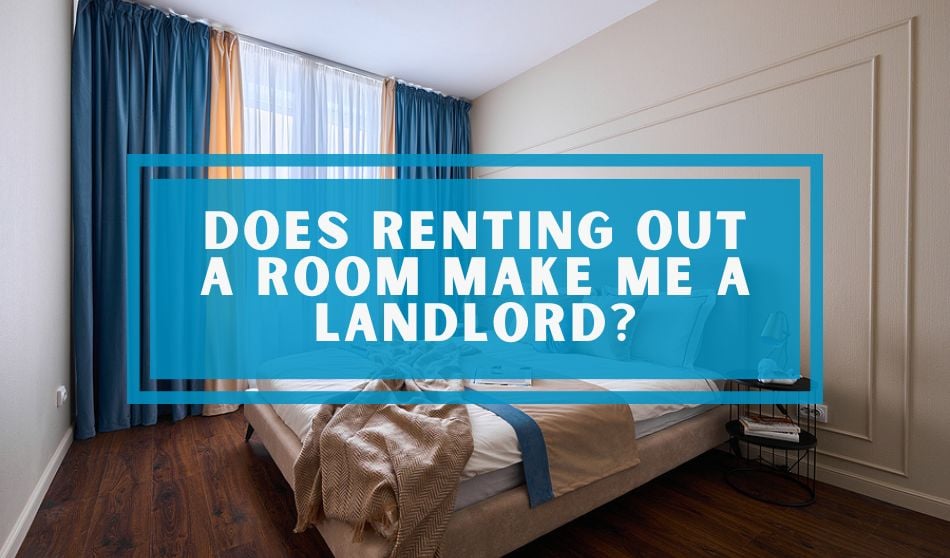
When most people think of tenants and landlords, they don’t usually envision them living under the same roof. But what happens when someone decides to rent out a room in their house? Be sure you understand the legalities of renting out a room as well as your potential obligations in the process.
Do you become a landlord even though you aren’t managing a rental building? The short answer is yes, but the implications go far beyond a simple title. Even if you’re just renting out a room, there are still rules and regulations that apply to you. And to be a successful landlord, you’ll want to be sure you’re familiar with all the particulars. If you aren’t, it could result in major legal consequences.
Whether you’re considering this as a long-term source of income or a temporary solution to your financial needs, understanding your role along with your financial responsibilities is crucial. Let’s explore what it means to become a landlord and the steps you should take to ensure a smooth and compliant room rental arrangement.
Is Renting Out a Room in Your House Legal?
Various factors can impact the legality of renting out a room in your home. These factors may greatly depend on where you currently reside.
Homeowners Association Regulations & Laws
Homeowners Association (HOA) regulations and laws play a significant role in shaping the dynamics of renting out rooms within a residence. These associations are responsible for establishing and enforcing rules that govern properties within a specific community or development. Some may permit room rentals with certain conditions, while others may have strict prohibitions in place, including rules regarding renting to non-family members.
Municipal Zoning Laws
Before you decide to rent out a room, it’s important to thoroughly research and understand municipal zoning laws, which are the local regulations that govern land use and development. Some cities or towns may require landlords to obtain a license or permit before renting to unrelated individuals. Additionally, there may be limitations on the number of unrelated tenants allowed in a single residence. These laws aim to balance the interests of property owners with the overall well-being and character of the community, and violating them can result in fines and other legal trouble.
Unique Access Requirements
Unique access requirements pertain to the specific conditions that some cities may impose on rental properties within a residence. This regulation often involves the necessity for a separate, private outdoor entrance to the rental space. Having a distinct outdoor access point enables tenants to come and go freely without intruding into your private living spaces. Essentially, a delineation of spaces helps maintain a sense of autonomy and privacy for both parties involved.
Inspections or Habilitability Requirements
Municipalities set habitability requirements, some will compel that a rental go through a thorough evaluation of a rental space before it can be legally leased. Typically focused on safety, health, and compliance standards, these inspections cover areas like electrical systems, fire safety, and structural integrity. They also assess health and sanitation factors, including potential hazards like mold or pests.
Local, City, and State Laws
Local, city, and state laws cover various aspects, from zoning ordinances to tenant-landlord regulations, addressing occupancy limits, safety codes, licensing, and more. As a landlord, you must understand and adhere to these laws in order to avoid legal issues and conflicts with tenants. Your state and local laws will also determine the rights that your tenant will have; if rent or services are exchanged for the space, they will likely be legally considered a tenant and will have certain tenant rights.
Specific Conditions or Criteria
Depending on the area, there may be specific conditions or criteria that must be met in order to legally rent out a room, such as safety standards, occupancy limits, and more. For instance, safety features like smoke detectors may be required, and limits on occupancy may be enforced to ensure a safe living environment.
Financial Responsibilities
Once you’ve determined whether or not it’s legal for you to rent out a room, you’ll want to familiarize yourself with the financial responsibilities that come along with it.
Advertising and Marketing
When you rent out a room, you’ll have to advertise it and market it. While there are various platforms available for listing a room for rent, it’s important to understand that any expenses incurred during this process are your responsibility. A well-presented and well-marketed room is more likely to find a suitable tenant quickly.
Property Maintenance
Maintaining the rental room and the surrounding common areas in good condition is a fundamental duty of a landlord. This means addressing repairs promptly and making sure that the rental room meets all health and safety standards.
Rent Collection and Record Keeping
You’ll also be responsible for collecting rent on time and keeping detailed records of payments. With accurate records, you’ll be able to track financial transactions easily, and you’ll have a clear paper trail in case of any disputes.
Security Deposits
If applicable, you’ll need to handle security deposits appropriately, which may include holding them in a separate account and returning them within the legally required timeframe at the end of the lease. Asking for security deposit insurance may make this process easier to manage if you are new to renting out a space.
Property taxes
Regardless of whether you’re a landlord of an entire property or just a room, you’re obligated to pay property taxes. Maintaining up-to-date property tax payments is not only a legal obligation but also essential for ensuring that your property remains in good standing with local authorities. Failure to pay property taxes can lead to penalties, liens on your property, and potentially even foreclosure in extreme cases.
Benefits of Renting Out A Room
While being a landlord comes with a hefty set of responsibilities, it also offers a range of benefits.
Additional Income
Renting out a room provides a steady stream of extra income, which can help cover mortgage payments or other expenses.
Substantial Savings
If you’re living in the same property as your tenant, having a roommate can significantly reduce your monthly living costs. Shared expenses like rent, utilities, and even groceries can lead to substantial savings.
Cultural Exchange and Networking
Having a tenant live in a room in your house can lead to meaningful social interactions and potential networking opportunities. Sharing your living space with someone from a different background or profession can be a rich cultural exchange.
Security and Companionship
Having someone around can offer companionship and make your living situation more enjoyable — especially if you live alone. Living with someone else can also be comforting, since it provides an added sense of security.
Tips For A Successful Room Rental
To ensure a positive room rental experience, consider the following steps.
Lease Agreements
Drafting a clear and comprehensive lease agreement protects you and your tenant. By creating a detailed agreement that outlines the terms and conditions of the rental arrangement, including rent amount, payment schedule, house rules, and the duration of the lease, you’ll set yourself up for a smooth rental process.
Tenant Screening
If you’re renting out a room, you’ll have more peace of mind if you conduct a thorough tenant screening. To screen potential tenants, you’ll need to conduct background checks, verify employment and income, and check rental history. Doing so will ensure you’re selecting a reliable and trustworthy tenant.
Get References for Previous Roommates
Request references from their previous roommates. Learning about a person’s compatibility as a living partner from someone who has shared living space with them offers valuable insights, as opposed to relying solely on the landlord, who may not be familiar with their day-to-day habits and interactions.
Maintain Open Communication
Open communication serves as the cornerstone of a successful room rental arrangement. It’s not only about conveying information, but also about creating an environment where both you and your tenant feel comfortable expressing needs and concerns. It also means being responsive to your tenant’s concerns or requests, which will help foster a sense of trust and mutual respect.
Set Expectations from the Beginning
Establishing clear expectations regarding rent payment, shared responsibilities, and any house rules can help prevent misunderstandings and ensure a harmonious living environment. It’s wise to create a well-defined set of house rules for the tenant as well, including guidelines regarding noise levels, overnight guests, pet policies, and extended vacations from the property.
Establish Boundaries
Clearly define the areas of the house that are accessible to the tenant and set boundaries for shared spaces. It’s important to discuss and agree upon common areas such as the kitchen, living room, and outdoor spaces. This way, your tenant will understand their rights and responsibilities.
Respect Privacy
Respecting your tenant’s privacy is not only a legal obligation but also a good way to foster a positive and respectful tenant-landlord and roommate relationship. Always provide advance notice before entering their rented space for any reason, even for routine inspections or maintenance.
Ensure Safety and Security
Installing secure locks on bedroom doors provides an added layer of protection and peace of mind not only for your tenant, but for you as well. Consider implementing other safety measures, such as window locks, smoke detectors, and proper lighting in common areas. You should also regularly inspect and maintain these safety features. Doing so will demonstrate your commitment to your tenant’s well-being.
Key Takeaway
Whether you’re interested in starting your own rental business or simply looking to make some extra income by renting out a room, it’s best to go into it knowing all the details about how to navigate the process effectively. Being well-informed will not only help you secure a good tenant but will also ensure a successful and harmonious experience for both of you involved.





